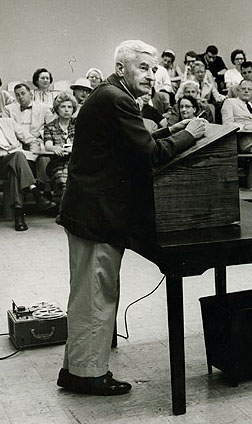Audio Clips
| CLOSE WINDOW TO RETURN TO MAP |

 Photograph by Ralph Thompson © Rector and Visitors, University of Virginia |
During the 1957 and 1958 Spring semesters, William Faulkner was the Writer-in-Residence at the University of Virginia. During that time he appeared at thirty-six different public events, reading from his work and answering over 1400 questions from students, faculty and others. Thanks to two members of the Department of English, Frederick Gwynn and Joseph Blotner, most of those sessions were recorded, and preserved on tape in the University of Virginia Special Collections Library. Over 28 hours of the recordings have been digitized, and are available online in the Faulkner at Virginia audio archive . The mp3 clips available below have been taken from that archive, and are playable on most devices. NOTES: Faulkner read an abridged version of this story to a Virginia audience on March 7, 1957; you can hear it at the Faulkner at Virginia archive. In the second clip below Faulkner uses an offensive racial term with a casualness that can help us understand the character, racial and ideological, of his audiences at that time and place. What do the spotted horses symbolize? (13 March 1957; 1:07) |
What do the spotted horses symbolize? (13 March 1957; 1:07)
William Faulkner: Yes, sir.
Unidentified participant: Sir, what are the spotted horses symbolic of, if anything?
William Faulkner: As spotted horses, I don't know. I—that—that may be symbolical, but as horses, that was—was—they—they symbolized the—the hope, the aspiration of—of the masculine part of society, that is capable of—of doing, of—of committing puerile folly for some gewgaw that—that has drawn him, as juxtaposed to the cold practicality of—of the women, whose spokesman Mrs. Littlejohn was when she said "Them men!" or "What fools men are!" That the man even in a society where there's a constant pressure to conform can still be taken off by the chance to buy a horse for three dollars. Which to me is a good sign, I think. I hope that man can always be [tolled] off that way, to—to buy a horse for three dollars.
Faulkner's own spotted pony. (7 March 1957; 2:35)
Unidentified participant: Mr. Faulkner, have you ever such an auction taking place?
William Faulkner: Yes'm. I bought one of these horses once. [audience laughter] They appeared in our country. Every summer somebody would come in with another batch of them. They were western range-bred ponies, pintos. Had never had a bridle on them. Had never seen shell corn before. And they'd brought—be brought into our town and auctioned off for prices from three or four dollars up to six or seven, and I bought this one for four dollars and seventy-five cents. I was—[audience laughter] oh, I reckon ten years old. My father at that time ran a livery stable, and there was a—a big man. He was six feet and a half tall. He weighed two hundred pounds, but mentally he was about ten years old, too. And I wanted one of those horses. My father said, "Well, if you and Buster can buy one for what money you've saved, you can have it." And so we went to the auction, and we bought one for four dollars and seventy-five cents. We got it home. We were going to gentle it. We had a two-wheel cart made out of the front axle of a buggy with shafts on it, and we fooled with that [creature]. It was—was a wild animal. It was a wild beast. [audience laughter] It wasn't a domestic animal at all, and finally Buster said that it was about ready, so we had the cart in a shed. Estelle probably remembers this. We put a croaker sack over the horse's head and backed it into the cart with two niggers to—to fasten it in, to buckle traces and toggles and things, and me and Buster got in the seat, and Buster said, "All right boys, let him go." [audience laughter] And they snatched the—the sack off the horse's head, and it went across the lot. There was a big gate. The lane had turned at a sharp angle. It hung the inside wheel on the gatepost as it turned. We were down on one hub then. Then about that time, Buster caught me by the back of the neck and threw me, just like that, and then he jumped off. [audience laughter] And the cart was scattered up that lane, and we found the horse a—a mile away run into a dead-end street. All he had left on him was just the hames, the harness was gone. [audience laughter] [But] that was a [pleasant] experience. But we kept that horse and gentled him to where I finally rode him. But I loved that horse because that was my own horse. I bought that with my own money. [audience laughter]
Suratt's name change. (6 May 1958; 0:59)
Unidentified participant: Mr. Faulkner, in connection with this class in particular, we've been very interested in reading about names in America, about personal and geographical names. I wonder to what extent the names that you use parallel those that have actually occurred in your lifetime, or in any history that you may have learned.
William Faulkner: I think any writer is very careful always not to use actual names if he can help it because a great deal of his time would be taken up explaining to the actual owner of that name that he didn't refer to him, was not impugning his character nor his past nor his parentage.
Edward Stevenson: Originally in "The Spotted Horses" story, weren't you going to call the sewing machine salesman Suratt, and then you met somebody by that name so you changed the name to Ratliff, [didn't you]?
William Faulkner: Yes, that's right.
